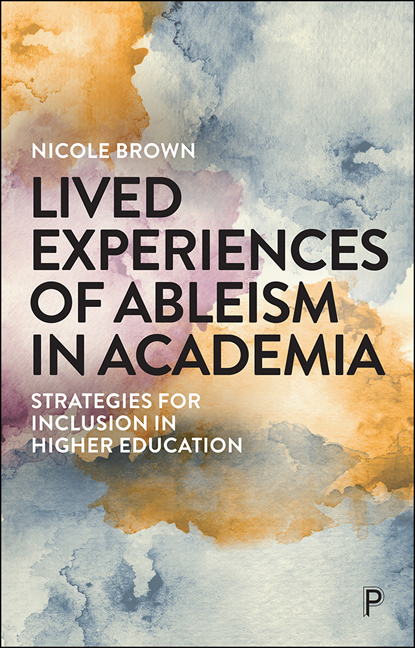PART I - Ways of knowing
Published online by Cambridge University Press: 18 December 2021
Summary
Expectations within academia result in specific ways of working and knowledge production being favoured. These tend to be linked to post-positivist frameworks and paradigms, even within the qualitative realm. This tendency is further compounded by government strategies and initiatives that emphasise the role and relevance of the hard sciences as compared to the contributions the soft sciences or creative industries may have to offer. These trends towards an absolute, rational knowledge are at odds with individuals’ personal experiences of illness and disabilities and their needs to make sense of what happens in their everyday lives.
Part I of this book therefore considers ways of working and knowledge production to generate data and provide context of experiences. The contributions in this part present a range of frameworks to exploring the lived experiences of disability and illnesses within academia. The autoethnographic, autobiographical and embodied perspectives presented in this section provide structured and insightful lenses through which disability experiences can be explored critically, analytically and rigorously.
By the second decade of the 21st century, interpretative methods and approaches within qualitative research are no longer unique, innovative or outlandish. Yet, the process of undertaking autoethnography, self-narrative or embodied inquiry is not without risks. As will be shown in the subsequent chapters, this form of inquiry is incredibly personal (Bochner and Ellis, 2002), which may be considered self-indulgent or narcissistic (Salzman, 2002; Sparkes, 2002). However, through the consistent application of self-examination and self-reflection, self-inquiry helps in making sense of one's own experiences, which in turn leads to better understanding of others (Chang, 2016). Finally, by sharing the self-inquiry the researcher-authors are able to affect their readers and initiate transformation (Berry, 2006). The ambitious aim in this part of the book lies in demonstrating the value of autoethnographic, autobiographical and embodied perspectives in making sense of and presenting lived experiences.
- Type
- Chapter
- Information
- Lived Experiences of Ableism in AcademiaStrategies for Inclusion in Higher Education, pp. 15 - 16Publisher: Bristol University PressPrint publication year: 2021

